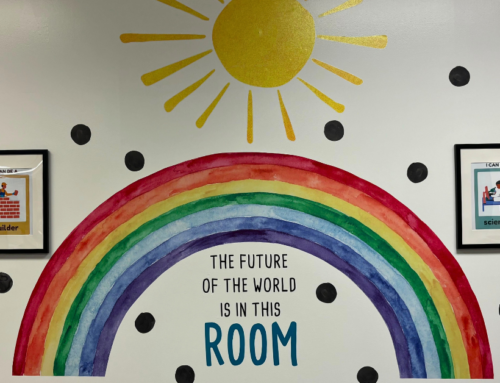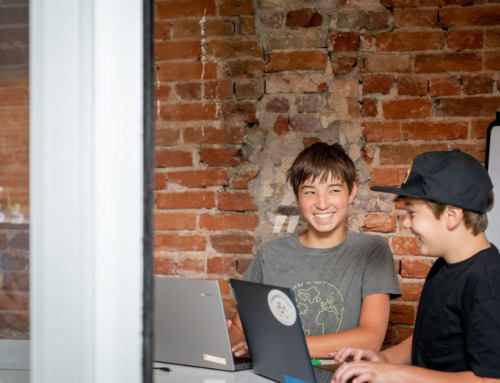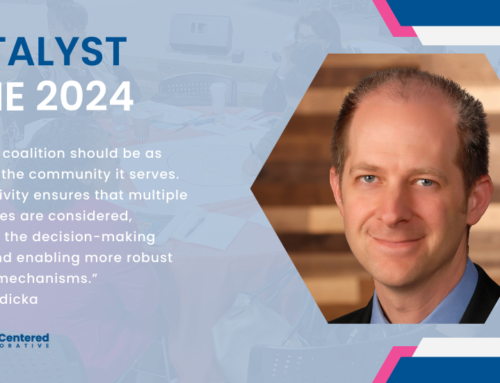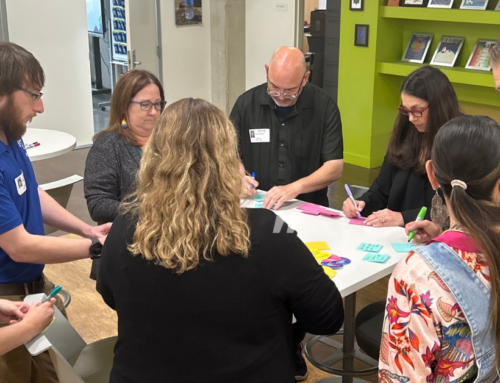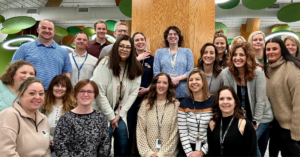
Learner-Centered Collaborative has partnered with South Allegheny and Duquesne City School Districts in Pennsylvania to host an Innovation Cohort in 2023-2024.
Each cohort evolves with the needs and interests of the participants, but typically includes:
- Self-paced, online courses that forward and strengthen learner-centered practices
- Virtual Communities of Practice sessions
- In-person sessions to discuss learnings, collaborate, and get feedback from peers within and across participating schools and districts.
We had an opportunity to speak with one of the cohort participants, Erica Slobodnik, an educator at Duquesne City Public Schools, to learn about her experience and her broader story as a second-grade teacher who is driven to make every learning experience as meaningful as possible for her students.
Q: The South Allegheny and Duquesne City cohort participants recently came together for an in-person professional development day with Learner-Centered Collaborative. What value did you receive from that experience?
Erica: I love to communicate, and I love to collaborate, so being in-person and being able to collaborate with South Allegheny educators and the teachers in my district was priceless. It was a lot of hands-on work and allowed us to move our bodies around. We weren’t just sitting in our chairs all day.
In terms of content, my biggest takeaway was the ideas and conversations around student voice and choice. That was the big phrase that kept resonating with me throughout the day. How can I bring more student choices into my classroom? How can I give them a voice in what they’re learning or how they want to be assessed?
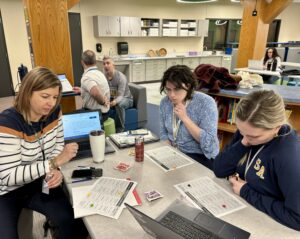
Educators in the Innovation Cohort collaborating together
Q: For someone who might be worried about offering too much voice and choice to younger learners (like your second graders), what would you say to them about the possibilities?
Erica: I feel the assumption that my kids can’t do that should not even be a thought. All kids can do anything. You might have to differentiate, but all kids should be given an opportunity to do everything, and as an educator, I need to push their own expectations of what they think they can do.
I want my students to become more accountable each day, and it doesn’t matter how young they are. If you have the mindset that “they’re seven years old, they can’t do that,” I simply say, “Yeah, they can.” I see it every day in my own classroom. You have to be able to give your students the opportunity, and they will surprise you with what they can actually do.
Q: What’s one way you’ve tried to introduce more voice and choice within your classroom as a result of things you’ve learned within the Innovation Cohort?
Erica: Learner-Centered Collaborative’s course on Customizing the Learning Experience introduced me to the idea of a Wonder Wall. I knew I wanted to teach about outer space, but that’s such a broad starting point, right? The Wonder Wall allowed my students to use post-it notes and share what they wondered about outer space.
I reviewed what everyone wrote and a lot of students showed an interest in the sun. So I’m like, “Okay, I know I want to cover something involving the sun.” Instead of me deciding what I wanted to teach, I gave them an opportunity to tell me what they were interested in, and what their wonders were. I used those wonders to make my next lesson.
My students have so many wonders and unless I give them a space to express them, I’m never going to know. By doing that, it makes the lessons more engaging, they’re more engaged, and the overall learning experience is just better for the students.
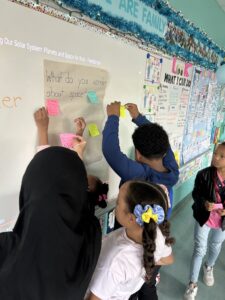
Students sharing their wonders with a Wonder Wall
Q: It sounds like this means you can’t recycle lessons year after year. Is that true and isn’t that more work?
Erica: I create brand new lessons each year, which is a lot of work. But, I feel like every year is so different, you have a different diversity of students in front of you. So why should you always be doing the same thing? Education is constantly changing, so we have to go with what the students are interested in.
It does take time to do this, to give them choice and voice, but I feel like the more engaged they are, the more they’re going to retain their learning. And if they’re accountable for their learning, again, they’re going to retain the information. Said another way, I don’t like to be told what I want to learn about, so why would I expect my students to be any different?
When the students know their interests are in the room, the class feels more like a family. When they know that I value their interest, it really builds the classroom community.
Q: When you think about your district learning community, what do you value most about how leadership approaches their work?
Erica: Like most places, we have topics we have to teach, but how we go about teaching those things is our choice. They welcome us to think outside the box and always try new things. We aren’t being told, “You have to do it this way.” Instead, we get to experiment and if we do fail, it’s okay.
I never have the thought, “If I do this thing, I might get in trouble.” We are empowered to do those things because, at the end of the day, it comes down to the fact that each classroom of students is different. As teachers, we know our students, and we know what works best for them. We might be covering a similar topic from one classroom to the next, but the way we teach it and the experiences our students have should be different based on their needs.
Our administrative team is always here for us. I know I can have a conversation about a lesson or about a student and won’t feel like they are looking down on me. They’re just here to support us and, at the end of the day, make our students better.
Are you an educator or school leader interested in deepening your learner-centered practices through collaboration and community? Learn more about getting involved in a future Innovation Cohort here.

